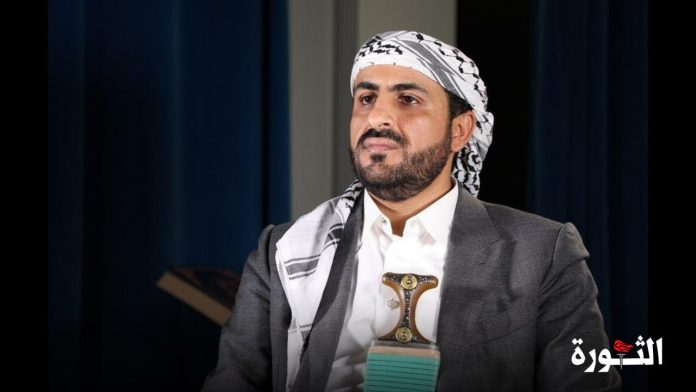Mohammed Abdulsalam, spokesperson for Ansarullah and head of the National Delegation, reaffirmed Yemen’s position on the developments in Syria, emphasizing that Yemen’s stance is closely linked to the broader issues of the Arab nation, particularly the Palestinian cause.
Abdulsalam noted that the new regime in Syria differs from its predecessor, consisting of religious groups that raise slogans of jihad in the name of Allah and chant takbeer, unlike the previous secular regime.
He urged these groups to focus their efforts on confronting the Israeli enemy, asserting that Yemen, along with the honorable people of the nation, would stand in solidarity with them if they adopt this approach.
He highlighted statements made by Israeli Prime Minister Benjamin Netanyahu, who celebrated the overthrow of the previous Syrian regime, calling it a historic achievement against the Islamic Republic of Iran and Hezbollah.
“We believe the outcomes in Syria present two paths: either Syria aligns with normalization and conciliation, in which case Yemen will not support it, or it embraces the causes of the nation—foremost among them, the Palestinian cause and Syria’s own sovereignty. Yemen will stand with Syria if it chooses this path,” Abdulsalam said.
He criticized the Islamic groups in control of Syria, stating that while they claim readiness to liberate their land, they have failed to take action against Israel, which continues to violate Syrian sovereignty and bomb its territory. He pointed out that these groups have not even issued a condemnation of Israel’s actions.
Abdulsalam explained that Israel seeks to weaken neighboring Arab countries, forcing them into normalization agreements similar to those with Egypt and Jordan. He stressed that Yemen does not wish for Syria to succumb to such arrangements, recalling Syria’s historic role in confronting Israel alongside other Axis nations.
He warned that Israel’s ultimate goal is to render Syria a demilitarized, weak, and defeated state, stripped of its sovereignty. He urged the new Syrian leadership to take decisive action, emphasizing that complacency would be a dangerous mistake.
Addressing comparison between Yemen and Syria, Abdulsalam clarified that Yemen’s situation is fundamentally different. He noted that armed groups in Syria took control without significant confrontation with the Syrian army. In contrast, he stressed that Yemen remains stronger than ever, with its forces prepared for a full-scale war across land, sea, and air if necessary.
He warned potential aggressors against targeting Yemen, stating that any attack would provoke devastating retaliation. He emphasized Yemen’s enhanced capabilities across all domains and highlighted the surge in support for Yemen’s resistance following the Al-Aqsa Flood operation, with thousands of new fighters joining the cause.
Abdulsalam concluded by affirming Yemen’s resilience and readiness, reiterating that any escalation against Yemen would be met with unparalleled force, ensuring severe consequences for its enemies.


















